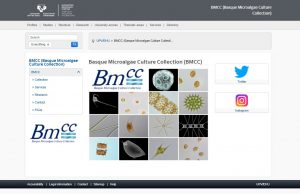The Basque Microalgae Culture Collection (BMCC), of the University of the Basque Country (UPV/EHU), maintains more than 600 strains of marine and freshwater microalgae and cyanobacteria, mainly from the Basque Country, although counts with species collected in different parts of the world.
This collection was registered within the World Federation for Culture Collections (WFCC, World Federation for Culture Collections) in 2020 and is part of the Spanish Network of Microorganisms (REDESMI). Among its taxonomical groups that can be found in collection in BMCC we can find different species of haptophytes, cryptophytes, dinoflagellates, chlorophytes, diatoms and cyanobacteria.
BMCC is part of the Plentzia Marine Station (PiE-UPV/EHU), which is one of the operators of the Spanish node of European Marine Biological Resource Centre (EMBRC-ERIC) and a partner in European Blue Biobank (EBB) project. BMCC facilitates access to biological resources with great biotechnological potential for both private and public companies or institutions. Moreover, the strains held at BMCC may play a pivotal role in biotechnological developments or be research focus leading to patent generation or scientific publication. Culture collections also play an important role preserving biodiversity, mission that has been recently underpinned under the biodiversity goals of the Convention of Biological Diversity and the entry into force of its Nagoya Protocol and its associated Access and Benefit Sharing (ABS) regulations.

In addition to supplying isolated algal strains already identified, the BMCC offers additional services such as the isolation and identification of species, the production and supply of culture media, the possibility of depositing strains in the collection or the characterization of some compounds present in microalgae. Such services are available for companies or researchers, both for basic and applied research.
This collection opens its doors to the rest of the world through its new website, which has an access portal that has been funded by EBB project, and that can be visited in this link

